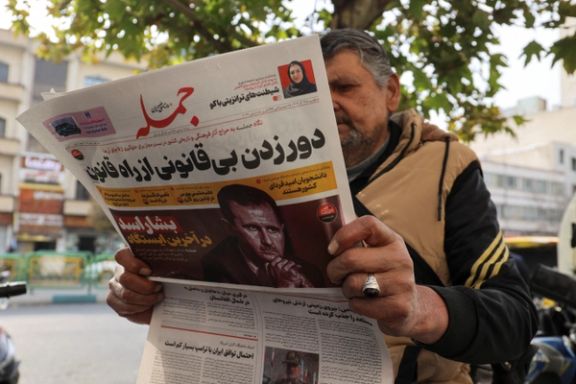Iran may face domestic unrest after Assad's downfall

The fall of Syrian President Bashar al-Assad has deprived the Islamic Republic of a key partner, weakening its influence abroad and tearing away a fear barrier which could inspire Iranians to rise against their own rulers.
Iran’s outpost in Syria has collapsed, Chris Doyle, director of the Council for Arab-British Understanding told Iran International, upending Iran's military strategy abroad so thoroughly that it may inspire opponents at home to oust the 45-year-old Islamic Republic.
“The Iranians have taken a huge hit here,” he told Iran International. “It’s certainly ripped up that important [smuggling] corridor it relied on, from Iran to the Mediterranean. Syria now will be a country not in Iran’s control. Iran will lose a lot of assets they’ve invested in, properties they took over won’t remain Iranian.”
He said that as a result of the rapid fall of Syria in less than a week, after being in the hands of the Assad family for five decades, it could also bode well for a full overthrow of the government in Iran, which has been growing ever weaker since the uprising of 2022.
“It will be inspiring many people across the region to see what Syria has done and that will be unnerving for the Iranian regime,” not least, with the weakening of Iran-backed allies Hezbollah in Lebanon and Hamas in Gaza, leaving Iran’s archenemy Israel now in a much stronger position.
“The borders of Syria are certainly not in the hands of the Assad regime now," he dais and highlighted that Kurds control the borders with Iraq. "If Iran wanted to smuggle weapons and fighters into Syria, the Iraqi border is very important. Iran will be reassessing its strategies here and with a Trump administration coming, who knows. It faces some stark choices."
Arash Azizi, a visiting fellow at Boston University’s Pardee Center for the Study of the Longer-Range Future, said he agrees.
"The fall of Assad is the most important blow the Iranian regime has suffered in years," he told Iran International. "It signals the collapse of its 'Axis of Resistance' [military allies across the region] which has been the mainstay of Khamenei’s policy during most of his decades-long term as Supreme Leader," he added.
Iran has for decades supported groups in countries including Yemen, Palestine, Lebanon and Syria.
"Khamenei already had problems saving face given the massive blows the Axis received in the last year but this leaves him further humiliated and isolated," he said, referring to the blows dealt to Iran's largest proxy Hezbollah in Lebanon, and Hamas in Gaza.
After the Hamas invasion of October 7 last year, Israel has been engaged in its longest ever conflict with the Iran-backed group, while Hezbollah on Israel's northern border attacked on a second front, with others from Yemen, Iraq, Syria and the West Bank.
Israel has killed huge swathes of Hezbollah's leadership, including long-time leader Hassan Nasrallah, and according to the Israeli military, taken it back decades. In Gaza, Hamas has also been dealt a huge blow, with the majority of its battalions and infrastructure across the strip destroyed.
Internally, it will also hurt Tehran, said Azizi, in addition to the risks it now faces from the incoming Trump presidency, who has vowed a "maximum pressure" approach to Iran and its allies.
"The fall of Assad shows the weakness of the Iranian regime and will be definitely a boost for the regime’s opponents. It will inspire them to take it on especially as the regime is hemmed in from other sides too: the return of Trump to White House will likely bring renewed pressure on it and Israel is also strengthened," he explained.
"But it will also have effects on the regime’s internal composition. Those factions who seek a deal with the West and want Iran to step back from some of its aggressive policies will see a boost. They will try to get a deal with Trump at any price that might get them some respite."
However, Azizi argued the opposition to the Islamic Republic must become better organized to capitalize on the changing landscape for the impact to be truly felt at home.
"The Iranian opposition could have used this as an excellent opportunity to act against the regime but it’s extremely disorganized and thus not able to," he said. "Its hope will rest on spontaneous movements from the Iranian people — which can never be predicted but is always possible."
Ehud Yaari, an Israeli Lafer International Fellow at The Washington Institute, wrote on Sunday that while concerns persist about weapons such as chemical arms, long-range rockets, and surface-to-surface missiles falling into extremist hands, it is “time to celebrate” the downfall of the Assad dynasty, which ruled for over 50 years.
He said the need to reinforce the Druze communities on Israel's northern border is vital, and that is now recognized by the Israeli government.
“The concerns about chemical weapons and heavy missiles falling into the hands of the rebels are certainly justified, but let us remember that there is a huge distance between seizing chemical materials and the ability and, of course, the desire to use them,” he wrote in his column for Channel 12.
“The rebel leaders already announced this morning that they are ready to help international organizations dismantle the chemical weapons that Assad has accumulated and announced that in any case they have no intention of using them."